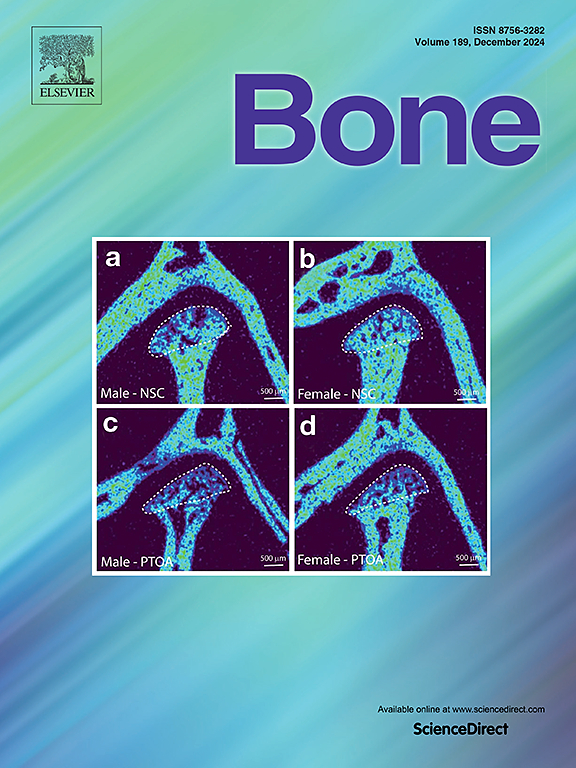手术后甲状旁腺功能减退症女性腰椎骨小梁评分的预测因素
IF 3.5
2区 医学
Q2 ENDOCRINOLOGY & METABOLISM
引用次数: 0
摘要
甲状旁腺功能减退症是一种罕见的疾病,它会显著降低骨重塑,导致骨矿物质密度增加和骨微结构的改变。然而,目前还不清楚这些变化如何影响骨折风险。在这项研究中,我们通过双能量X射线吸收测量法调查了甲状旁腺功能减退症术后女性患者的骨量、椎体骨折的形态发生率,以及通过评估骨小梁得分调查的骨微结构。我们纳入了67名年龄为(52.9±12.3)岁的甲状旁腺功能减退症女性患者和63名年龄(52.9±12.3)岁、体重指数相匹配的对照组患者,通过双能X射线吸收测量法评估了她们的股骨和腰椎骨矿物质密度、骨小梁得分和椎体骨折情况。与对照组相比,患有甲状旁腺功能减退症的妇女在腰椎、股骨颈和全髋部的骨质密度明显更高,尽管骨小梁评分值与对照组相似。椎体骨折评估显示,两名甲状腺功能减退症妇女出现椎体骨折,年龄均超过 65 岁。相反,对照组妇女没有发现脊椎骨折。在多变量线性回归模型中,我们发现年龄较大、糖尿病和腰椎矿物质密度较低是导致骨小梁评分值降低的重要预测因素。我们的研究结果表明,在65岁以下患有甲状旁腺功能减退症的术后妇女中,脊椎骨折并不常见。此外,甲状旁腺功能减退症女性患者的骨小梁评分值与年龄匹配的对照组相似,并且与骨折的传统风险因素有关,如年龄较大、2型糖尿病和较低的脊椎骨矿物质密度。LAY总结:长期甲状旁腺激素缺乏会降低骨转换率并改变骨骼特性,但这些变化对骨折风险的影响仍不清楚。我们研究了67名手术后甲状旁腺功能减退症女性患者和63名年龄与体重指数相匹配的健康对照者,结果发现,尽管甲状旁腺功能减退症女性患者的骨小梁评分值相似,且形态学上的脊椎骨折发生率较低,但她们的骨矿密度却有所增加。这表明,甲状旁腺功能减退症患者的骨转换率低,从而增加了骨量,但这并没有伴随着骨微结构的改善。本文章由计算机程序翻译,如有差异,请以英文原文为准。
Predictors of lumbar spine trabecular bone score in women with postsurgical hypoparathyroidism
Hypoparathyroidism is a rare disease that markedly reduces bone remodeling, leading to increased bone mineral density and changes in bone microarchitecture. However, it is currently unclear how these changes affect fracture risk. In this study, we investigated bone mass by dual-energy x-ray absorptiometry, the occurrence of morphometric vertebral fractures, and bone microarchitecture by assessing trabecular bone score in women with postsurgical hypoparathyroidism. We included 67 women with hypoparathyroidism aged 52.9 ± 12.3 years and 63 age- and body mass index-matched controls, which were assessed for femoral and lumbar spine bone mineral density, trabecular bone score, and vertebral fractures by dual-energy x-ray absorptiometry. Women with hypoparathyroidism had significantly higher bone mineral density at the lumbar spine, femoral neck, and total hip compared with controls despite similar trabecular bone score values. Vertebral fracture assessment indicated that two women with hypoparathyroidism presented vertebral fractures, both aged over 65 years. Conversely, no vertebral fractures were detected in control women. In a multivariate linear regression model, we found that older age, diabetes, and lower lumbar spine mineral density were significant predictors of lower trabecular bone score values. Our findings indicate that vertebral fractures are not common among women with postsurgical hypoparathyroidism aged under 65 years. Moreover, trabecular bone score values were similar in women with hypoparathyroidism and age-matched controls and were associated with traditional risk factors for fractures, such as older age, type 2 diabetes, and lower spine bone mineral density.
Lay summary
Chronic parathyroid hormone deficiency decreases bone turnover and modifies skeletal properties, although the impact of these changes on fracture risk remains unclear. We studied 67 women with postsurgical hypoparathyroidism and 63 age and body mass index-matched healthy controls and found that bone mineral density is increased in women with hypoparathyroidism despite similar trabecular bone score values and a low occurrence of morphometric vertebral fractures. This suggests that the low bone turnover in hypoparathyroidism increases bone mass, but this is not accompanied by improved bone microarchitecture, indicating that trabecular bone score may be a valuable tool to complement the assessment of skeletal health and the risk of fractures in this condition.
求助全文
通过发布文献求助,成功后即可免费获取论文全文。
去求助
来源期刊

Bone
医学-内分泌学与代谢
CiteScore
8.90
自引率
4.90%
发文量
264
审稿时长
30 days
期刊介绍:
BONE is an interdisciplinary forum for the rapid publication of original articles and reviews on basic, translational, and clinical aspects of bone and mineral metabolism. The Journal also encourages submissions related to interactions of bone with other organ systems, including cartilage, endocrine, muscle, fat, neural, vascular, gastrointestinal, hematopoietic, and immune systems. Particular attention is placed on the application of experimental studies to clinical practice.
 求助内容:
求助内容: 应助结果提醒方式:
应助结果提醒方式:


